Bolton Slams Biden For ‘Strategic Failure’ In Middle East
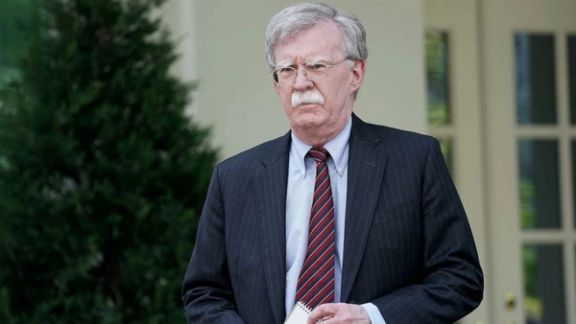
President Joe Biden’s policies on Iran and the Middle East are leading toward a “strategic failure”, former US national security adviser John Bolton says.

President Joe Biden’s policies on Iran and the Middle East are leading toward a “strategic failure”, former US national security adviser John Bolton says.
In an opinion article in the Wall Street Journal Wednesday, Bolton sharply rebuked Biden for pursuing the revival of the 2015 JCPOA nuclear deal, lax sanctions enforcement against Tehran, and his “apparent disdain for key Middle East allies.” He argued that Iran is overcoming a US policy of containment and Arab regional states, having lost confidence, are open to overtures by China and Russia.
Bolton also accused the administration of opposing an Israeli last resort attack on Iran’s nuclear installations to prevent the possible production of nuclear weapons, and in fact trying to prevent it.
He urged Biden to plan for a regime change in Iran, instead of making a deal that would release billions of dollars to the clerical regime. The former UN ambassador and national security advisor has long advocated that the only way to neutralize the threat posed by Iran is to change its anti-West regime.
At the same time, the Israeli Haaretz newspaper claimed that “major progress” has been achieved in contacts between Washington and Tehran for what appears to be an “interim deal”. In exchange for release of around $20 billion in frozen funds abroad, Iran would stop high-level uranium enrichment, the paper said.
The United States has been demanding that Iran stop its close military collaboration with Russia as a pre-condition for resuming the JCPOA talks. It is not clear that this would be part of an interim and limited agreement. Iran, which supplies weapons to Russia for its war in Ukraine, can use any released funds to accelerate its weapons production.

Khorasan newspaper, a daily linked to Supreme Leader Ali Khamenei's office, has claimed Iran is willing to accept some changes in the 2015 JCPOA nuclear agreement.
The low-key daily's report would have not been noticed much if was not re-printed by Tehran's leading economic daily Donya-ye Eqtesad, which opined that Tehran is likely to accept new terms in the nuclear agreement to which the United States and Iran are the most important parties.
A change in the JCPOA has been suggested by the United States as its precondition for returning to the talks with Iran over its controversial nuclear program. The United States demands some regional defense and security issues to be included in the new agreement nicknamed by the media as JCPOA Plus.
After 18 months of talks to revive the JCPOA came to a halt in September, the Biden administration has been saying it is no longer focused on the issue and has numerated a few conditions Iran must meet.
According to Khorasan, these issues include Iran's cooperation with Russia in the war against Ukraine. However, the daily noted that there are still no signs to indicate that the United States is willing to return to talks as both US Democrats and Republicans see Iran as "a dangerous country that should come under control, and the United States should make sure to prevent Tehran's access to nuclear weapons.
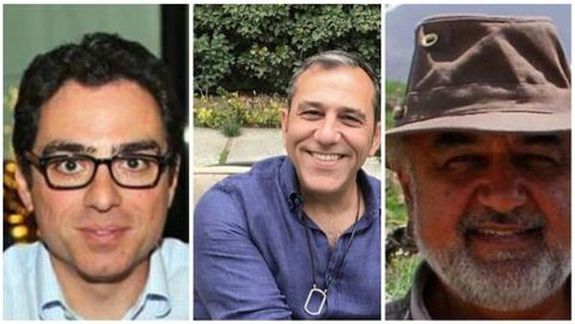
Nonetheless, Khorasan wrote that the Americans have said repeatedly an agreement with Iran is feasible. This comes while Iran has insisted it is willing to return to the 2015 agreement without any changes. The daily, however, added, presumably based on its access to insider information, that Iran is now prepared to accept some changes in the JCPOA if Washington offers guarantees about its commitment to the new agreement.
Khorasan added that regardless of Tehran's readiness to enter a new agreement, the two countries have big differences over non-nuclear issues the United States wishes to include in the document.
Meanwhile, Entekhab news website, which is close to Iran's moderates and the members of Iran's previous administration, quoted former diplomat Javid Ghorbanoghlou as saying that the government of President Ebrahim Raisi has missed the opportunity to revive the JCPOA because of its illogical slogans.
Ghorbanoghlou said that the hardliner members of the Raisi administration previously branded the JCPOA as a "disgrace" but now they wish to revive the same agreement. He added that currently, the United States is not interested in reviving the JCPOA and negotiating with Iran is not among its priorities.
He explained that recent contacts between the US and Iranian officials with the mediation of top Omani officials were merely meant to secure the release of US prisoners [meaning hostages] in Iran, an issue which has key significance for President Joe Biden ahead of the US elections.
Ghorbanoghlou said: Biden needs a victory in foreign policy following the fiasco in Afghanistan and the strategic surprises in Ukraine. Under the circumstances, releasing the prisoners has become a priority for Biden particularly after Belgium and other countries managed to get their imprisoned nationals out of Iran in recent weeks.
The former diplomat said although US efforts have not been successful so far, he is confident some of the US prisoners in Iran will be released soon as mediations are likely to become fruitful.
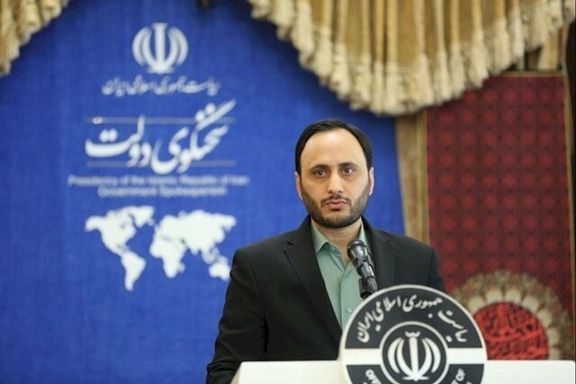
The regime spokesman has confirmed that authorities have access to unrestricted internet while the country faces blackouts.
Asked about the presence and activity of certain Iranian authorities and their children in social media platforms blocked for ordinary Iranians, Ali Bahadori Jahromi likened unrestricted internet access to assault weapons.
"The public don't have access to weapons, but the police have. Permissions are also issued for hunting weapons under certain conditions. The same applies to (social media) platforms, and this is what we see in most countries," Bahadori Jahromi told a gathering of Tehran University students on Tuesday.
He did not explain why the internet is restricted only in a few countries like the Islamic Republic and China, if "most countries" consider social media to be as dangerous as assault weapons.
While the public has very restricted access to the internet and social media platforms like WhatsApp, Instagram, Twitter, and Facebook, Iranian officials are able to have full access. The blockages have meant hundreds of thousands of Iranians are unable to work when already facing the worst economic crisis of recent history.
Documents leaked in January showed that Iran’s ministries of agriculture, communications, and industry had in separate letters requested to have access to unrestricted internet.
In one of those letters, an official at the agriculture ministry asked the communications ministry to provide "free, unfiltered and high-speed" internet to some people listed in the letter.
Since 2016, journalists close to the regime have unrestricted access to the Internet, while the government filtered more apps and websites during protests in recent months.
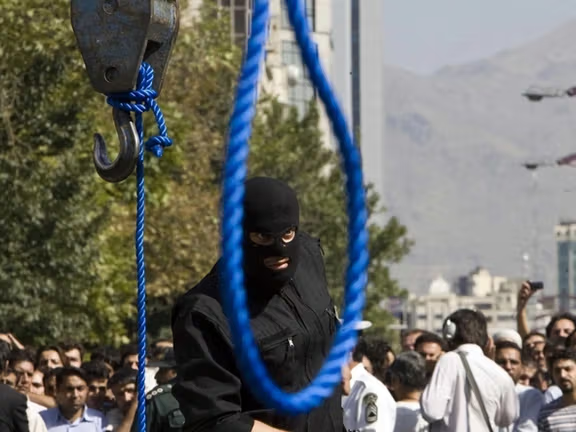
Twelve human rights organizations described the latest wave of executions in Iran as "alarming", calling for an immediate global response.
In a joint statement on Tuesday, they said:“These executions are deliberately designed to spread fear among the Iranian population and quash any form of dissent following the unprecedented nationwide protest movement that began eight months ago.
“Unless the international community takes robust action now, these executions will continue.”
The Abdorrahman Boroumand Center, Article 19, the Baloch Activists Campaign, Impact Iran, and Iran Human Rights are among the signatories against the chilling surge in executions by the Islamic Republic of Iran over the past few months, including the recent wave of executions targeting protesters.
As part of their calls for accountability, the rights organizations urged for targeted measures and restrictions against individuals and entities involved in these arbitrary deprivations of life.
“The recent executions in Iran demand an urgent and united response from the international community. We cannot stand idly by while scores of people are being executed, death row inmates and their families (who may themselves be persecuted for advocating on behalf of their loved ones) are waiting in terror, human rights are trampled upon, and justice is denied. The time for action is now,” read the statement.
At least 142 people were executed in Iran's prisons last month. This is the highest monthly figure since 2015.
Also, the number of executions in the first five months of 2023 has increased by 76% compared to the same period last year.
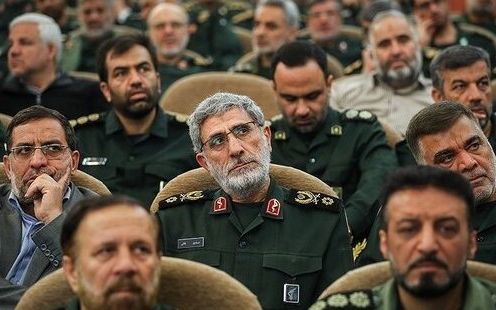
Israeli media reported that a new unit of the Iranian Islamic Revolutionary Guard Corps smuggles supplies and logistics for the Quds Force.
The unit is headed by a former Quds Force official with extensive connections in Iran, Syria, and Lebanon, identified as Gal Frasat, the Israeli weblog Intellitimes reported. According to Iran International's investigations the correct name of the agent is Ali naqi Golparast.
Among its duties will be transferring military equipment to pro-Iranian militias, particularly in Syria and Lebanon, the report adds.
The Qods Force manages most of Iran’s military, intelligence and even political affairs in Iraq, Syria, Lebanon and Yemen.
There have been several headlines regarding Iranian arms sales in recent years, particularly regarding smuggling weapons to terrorist militias in Gaza, Lebanon, and Syria, as well as supplying Russia with weapons during their war on Ukraine.
Last week, Ukraine approved sanctions against the Islamic Republic for a period of 50 years for its supplying weapons to Russia which have wrought havoc to cities in Ukraine. A massive 328 lawmakers voted in favor of the bill.
Among the sanctions were a ban on trade, the transit of Iranian resources, flights, and transportation within Ukraine, according to Ukrainian media.
SkyNews reported this week that Iran had been selling ammunition to Russia for its invasion of Ukraine. It was the first official confirmation of what Kyiv and Washington had long suspected.

Iran’s former foreign minister Mohammad Javad Zarif in unprecedented revelations said that Donald Trump had invited him to the White House, but he was “not allowed” to go.
Zarif was guest in a five-hour discussion session in Persian on the social media audio app, Club House, and around 40,000 people listened in.
The former foreign minister has long been a favorite target of Iran’s hardliners as the supposed architect of the 2015 JCPOA nuclear deal and allegedly as a man pre-disposed to forge better ties with the United States and Europe. But in recent days these attacks intensified as Zarif began to tweet after a long silence.
Zarif without mentioning a name said, “A senator close to Trump came to see me in New York and said Trump had invited me to the White House. I relayed this message to Tehran and said if I fail [in resolving differences] I will accept punishment, but the message did not reach higher echelons and was rejected at lower levels.”
Although Zarif did not mention when this incident took place, media reports during his visits to New York show that it was most likely in the first half of 2019,or a year after Trump withdrew from the JCPOA.
However, his claim that his message was not relayed to top decision makers leaves question marks. The nuclear dispute with the United States, crippling sanctions the Trump administration imposed and the danger of a military confrontation at the time, made a meeting with Trump a crucial development for Tehran and such a message would have certainly been delivered to Supreme Leader Ali Khamenei, the ultimate decision maker.

Zarif’s claim that lower-level people prevented him from meeting Trump, might be a tactic to protect Khamenei, whom many Iranians blame for the costly confrontation with the United States.
In fact, Zarif himself admitted during the discussion that “all reports were being relayed to Khamenei, and he expressed his opinion whenever he wanted…”
Zarif also spoke at length about his diplomatic efforts, trying to enlist the help of French President Emmanuel Macron and Russian President Vladimir Putin to make an opening with the Trump administration.
Zarif claimed that Macron told him in Paris that Trump was ready to meet with him, but “I did not have permission to meet with Trump.”
“In contrast to Trump, former Secretary of State Mike Pompeo was a person, who driven by his ideology spoiled everything related to the JCPOA. The triangle of Benjamin Netanyahu, Mike Pompeo and [former national security adviser] John Bolton” did everything to prevent a meeting with Trump.
This statement somewhat contradicted Zarif’s earlier assertion that he was not allowed by Tehran to meet with Trump.
“I asked Vladimir Putin to directly relay Iran’s plan for the JCPOA to Trump, without [Secretary of State] Pompeo’s intervention, but Pompeo realized this and prevented it.”
Zarif speaking about Iran’s inability to pressure the US said, “Iran can pressure Europe but due to American economic clout the Europeans acted in a weak manner regarding Iran, but they helped the Islamic Republic to obtain management posts in the United Nations.”
The former foreign minister was referring to European banks and companies generally abiding by US sanctions and adding to the economic pressure on the Islamic Republic. However, he did not mention any details about the posts he claimed Europeans helped secure at the UN.
Regarding the JCPOA negotiations from 2013-2015, Zarif said, “We wanted to break the security consensus formed against Iran and for this reason we negotiated. Removing [international] sanctions was not our only goal.”
Zarif’s appearance and statements in the Club House discussion are bound to reverberate in Iran and lead to strong attacks by hardliners. It is not clear why he chose to speak now and to what extent this is a part of an orchestrated effort by top decision makers, who are facing similar international isolation and security threats as a decade ago.